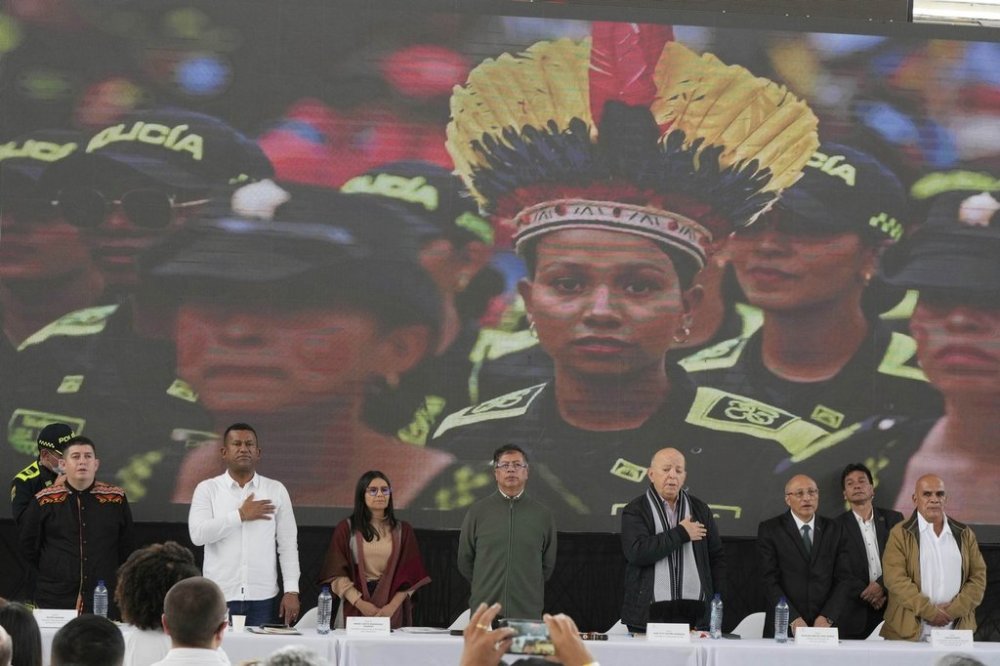A rebel group begins handing weapons over to the Colombian government as peace talks advance
Advertisement
Read this article for free:
or
Already have an account? Log in here »
To continue reading, please subscribe:
Monthly Digital Subscription
$0 for the first 4 weeks*
- Enjoy unlimited reading on winnipegfreepress.com
- Read the E-Edition, our digital replica newspaper
- Access News Break, our award-winning app
- Play interactive puzzles
*No charge for 4 weeks then price increases to the regular rate of $19.00 plus GST every four weeks. Offer available to new and qualified returning subscribers only. Cancel any time.
Monthly Digital Subscription
$4.75/week*
- Enjoy unlimited reading on winnipegfreepress.com
- Read the E-Edition, our digital replica newspaper
- Access News Break, our award-winning app
- Play interactive puzzles
*Billed as $19 plus GST every four weeks. Cancel any time.
To continue reading, please subscribe:
Add Free Press access to your Brandon Sun subscription for only an additional
$1 for the first 4 weeks*
*Your next subscription payment will increase by $1.00 and you will be charged $16.99 plus GST for four weeks. After four weeks, your payment will increase to $23.99 plus GST every four weeks.
Read unlimited articles for free today:
or
Already have an account? Log in here »
Hey there, time traveller!
This article was published 05/04/2025 (262 days ago), so information in it may no longer be current.
PASTO, Colombia (AP) — A rebel group called the Commoners of the South has begun handing its weapons over to Colombia’s government, the Defense Ministry said Saturday, as part of peace talks expected to lead to the group’s disarmament in the coming months.
The group of about 250 fighters operates in Colombia’s Southwestern Nariño province and has been in negotiations with the government since last year.
“This is a historic moment,” Defense Minister Pedro Sanchez said in a ceremony in the town of Pasto, where several accords with the group were outlined by officials.

Sanchez said that over the past two days, the Commoners of the South have handed over land mines, grenades and rockets to an army unit that is destroying them.
“Farmers will be able to walk without the fear of coming across a minefield,” Sanchez said.
Until recently, the Commoners of the South was part of the National Liberation Army, or ELN, a group of about 6,000 fighters that is still fighting Colombia’s government.
In May last year, the Commoners broke away from the ELN and began peace talks with the administration of President Gustavo Petro. That angered the ELN’s leadership and stymied its negotiations with Colombia’s government.
Petro, who was part of a rebel group in his youth, has been staging peace talks with nine separate rebel groups and drug trafficking gangs in Colombia under a strategy known as “total peace.”
Most of these negotiations have failed to reduce violence and so far only the Commoners of the South have agreed to begin a transition toward civilian life.
“The Commoners of the South are only one of nine problems” faced by the Petro administration, said Gerson Arias, an analyst at the Ideas for Peace Foundation, a think tank in Bogota.
“And they are only a small and marginal segment of Colombia’s armed groups,” he said.
Arias said the government has been trying to reach regional agreements with smaller factions of rebel groups that can take some pressure off the population, instead of larger, national accords.
“The talks with the Commoners of the South, are the only ones that may end up succeeding” in the Petro administration, Arias said. But he added that some issues still need to be resolved, such as the legal mechanisms through which victims of the group will be able to seek justice and truth.
In 2016, Colombia signed a peace deal with the nation’s largest rebel group, the Revolutionary Armed Forces of Colombia, or FARC, in which more than 13,000 fighters laid down their weapons.
But the FARC’s withdrawal from some rural areas created a power vacuum that smaller groups have tried to fill.
Colombia’s government is now struggling to provide security in remote rural areas, where various groups are fighting over drug trafficking routes and natural resources, while they forcibly recruit minors and tax local businesses to raise funds.
Earlier this year, more than 50,000 people were displaced from their homes in Catatumbo, a region along Colombia’s border with Venezuela, after the ELN attacked villages where it accused farmers of supporting a rival group.
The Colombian government suspended peace talks with the ELN following those attacks, with Petro accusing its leaders of becoming “greedy” drug traffickers who have betrayed their revolutionary ideals.
In Nariño, which is located along Colombia’s border with Ecuador, local officials are hoping that Colombia’s government keeps rebel groups away from the area, by providing greater security and economic development projects.
“If a peace deal is reached between the Commoners of the South and the government, we would like to know more about the strategy to protect this territory” said Giovanny Cardenas, a human rights official in the town of Samaniego.
“It would be tragic if this group demobilizes and another group comes here to continue the same war.”
___
Rueda reported from Bogota, Colombia.

